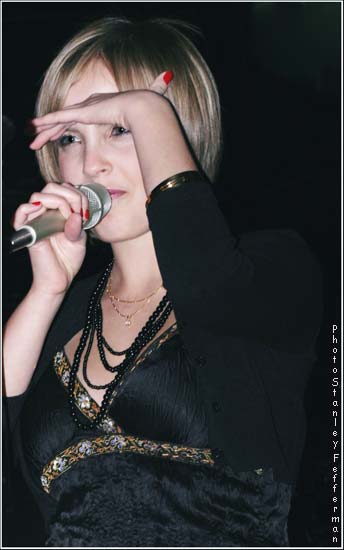|
|
| Sophie Milman |
|
| December 14, 2005 • Hugh's Room • Toronto |
|
|
|
|
|
|
Old Tunes for New
by Stanley Fefferman |
| A contingent from the Russian sector of North York occupied Hugh’s Room last night to support one of their own, Miss Sophie Milman, as she sang out of the Great American Songbook. How did Sophie do? I have to repeat, confidentially, a phrase Jack Yellen wrote in 1927: “O me, oh my, ain’t she perfection.” |
|
Sophie can sing: her honey alto sparkles like silver and rings like gold. Her vibrato ripples pure and even as she ends a phrase, and her phrasing is often strikingly original. Her style is relaxed, happy, with a touch of mischief: a winning combination for a very savvy ‘diva’ barely out of her teens who starts the set with “My Heart Belongs to Daddy” (Cole Porter, 1938). This she followed up with a swinging version of Nat ‘King’ Cole’s” Straighten up and Fly Right”. That tune’s refrain “Cool down, Pappa, don’t you blow your top” seemed like good advice for the many older guys in the audience.
A lot of credit goes to Miss Milman’s backup band led by Cameron Wallace on saxophones and featuring Paul Shrofel on keyboard. Wallace is her musical director and blows a Coltrane-soul-train alto, but his arrangements are something else entirely. A tune whose instrumental intro started off sounding to my keen ear like “Popeye the Sailorman” (recently recorded by Ron Davis who was in the audience), morphed into “Forget Your Troubles, Come On Get Happy” (Howard Arlen & Ted Koehler, 1929), before Sophie sang the words “Make Someone Happy” (Styne/Green/Comden, 1960).
|
|
 |
|
| There is definitely something new going on with this singer and this band. I can’t determine whether it’s Wallace’s arrangements or Sophie’s instinctive talent for dramatizing a song, but between them, like Jack Sprat and his Wife, they lick the platter clean.
I always thought Peggy Lee owned “Fever” (Davenport & Cooley, 1956). Joe Cocker did it, so did Madonna, and lately Beyonce did it. Nobody does it better than our Sophie, sending it out sultry and smoky and hot with a signature wave of her hand.
Then Sophie and the band kicked the Jazz Improv Meter up a notch with a tune that was unrecognizable even while Sophie started singing the words. Sounded good—mind you—a slow drag blues and the words, if not the melody, sounded sort of familiar as the first lines went by. But the tempo, the rhythm, the phrasing and the feeling were so teasingly different that it took some time before I got it: the Everly Brothers' first hit “Bye Bye Love” (Bryant & Bryant.1957).
They took this tune from slow drag up-tempo to swinging rock. Sophie gave it a sustained, improvised melodic twist that made it into a new tune riding like a surfer on the wave of the old tune. So I say, bye bye daddy’s girl, hello jazz singer.
|
|
|
|
|
|
|


